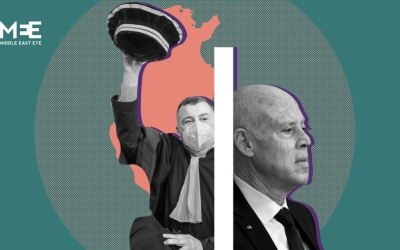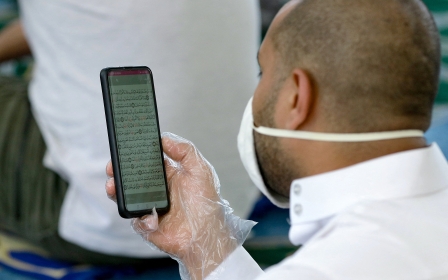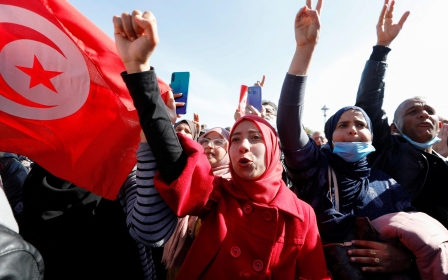Arabic press review: Jordanian MPs call for Israel to be declared apartheid state

Jordanian MPs call for Israel to be declared an apartheid state
In an official memorandum sent to parliament speaker Abdul Karim al-Dughmi, Jordanian members of parliament called for the government to declare Israel an apartheid state, according to the New Khalij website.
Twenty-five Jordanian MPs signed the memorandum, which cited a recent report by Amnesty International that accused Israel of apartheid, and made reference to the "ongoing crimes committed by the occupying power against the Palestinian people, of killing, deportation, property-grabbing, ethnic cleansing, the ongoing siege of Gaza and attempts at Judaizing Jerusalem."
"Since Palestine is considered the first issue of Jordan and the Arabs, we call upon the esteemed Parliament to adopt and circulate the content of the Amnesty International’s report of considering Israel as a state of apartheid," the memorandum said.
New MEE newsletter: Jerusalem Dispatch
Sign up to get the latest insights and analysis on Israel-Palestine, alongside Turkey Unpacked and other MEE newsletters
Amnesty International issued a report this February accusing Israel of subjecting Palestinians to an apartheid regime based on "segregation, property-grabbing and exclusion".
Tenfold increase in Jordanians in arrears
The number of Jordanians struggling to pay their debts has increased dramatically in recent years, with parliament debating legislation to prevent those in arrears from being detained, according to a report published by Arabi21.
A study issued by the Jordanian Judicial Council in 2021 indicated that there were about 143,000 financial lawsuits filed in 2019 across the country.
It is expected that this number has significantly increased after the Covid-19 pandemic and its subsequent impact on the country's economy and businesses.
A study issued by the Economic and Social Council of Jordan showed that the number of individuals facing sanction for non-payment of debts increased tenfold in just four years, from 4,352 in 2015 to 43,624 in 2019.
The current situation has prompted MPs to sign a memorandum proposing a general amnesty law to "maintain social security and relieve citizens", according to Arabi21.
The Jordanian authorities intend to amend article 22 of the Execution Law, which allows for the imprisonment of borrowers who default on their debt.
The government's proposed amendment states that the debtor should not be held in custody for debts of less than 5,000 dinars ($7,000), according to Wafa Bani Mustafa, the minister of state for legal affairs.
The legal counsel at Lawyers Without Borders said that it was "not possible to continue to hold the debtor in accordance with international charters because what he has done is a contractual obligation, and failure to commit cannot be regarded as an offence".
Concerns over safety of parliament speaker in Tunisia
The Ennahda movement has called on the Tunisian authorities to protect its president and speaker of the parliament Rachid Ghannouchi, following a wide campaign of incitement against the party and a number of its leaders, according to the London-based Al-Quds Al-Arabi newspaper.
Ennahda, the largest party in the now suspended parliament, said that it had sent official letters to the Presidency of the Republic, the Ministry of Interior and the Ministry of Defence, with the aim of holding them responsible for protecting Ghannouchi, his family, supporters of Ennahda and its headquarters.
Concerns about Ghannouchi’s safety came after public calls by Ennahda opponents to go to his home and to the movement’s central headquarters, which the Ennahda movement deemed a threat.
Medical negligence used to punish prisoners
The prison authorities in Egypt are using "medical negligence" as a means to punish detainees or sometimes to kill them slowly, according to human rights activists.
Moreover, a large number of these detainees are in "pre-trial detention", which means that they are detained without any judicial decisions or convictions, according to a report published by the London-based Al-Araby Al-Jadeed newspaper.
An Egyptian human rights activist said that "the obvious violations inside prisons are more dangerous than pre-trial detention, whether against convicts or those in pre-trial detention. The matter that is paid by all those who are aggrieved, along with their families.
These violations harm not only the detainees and their families, but also the unity and cohesion of society as a whole."
Egyptian human rights organisations have suggested that intentional medical negligence in prisons and places of detention against political prisoners could be considered a form of torture.
Campaigners argue the right to obtain adequate healthcare is being systematically violated, especially in high-security prisons, under a blackout policy that has exacerbated after the spread of the Covid-19 pandemic.
Middle East Eye delivers independent and unrivalled coverage and analysis of the Middle East, North Africa and beyond. To learn more about republishing this content and the associated fees, please fill out this form. More about MEE can be found here.





